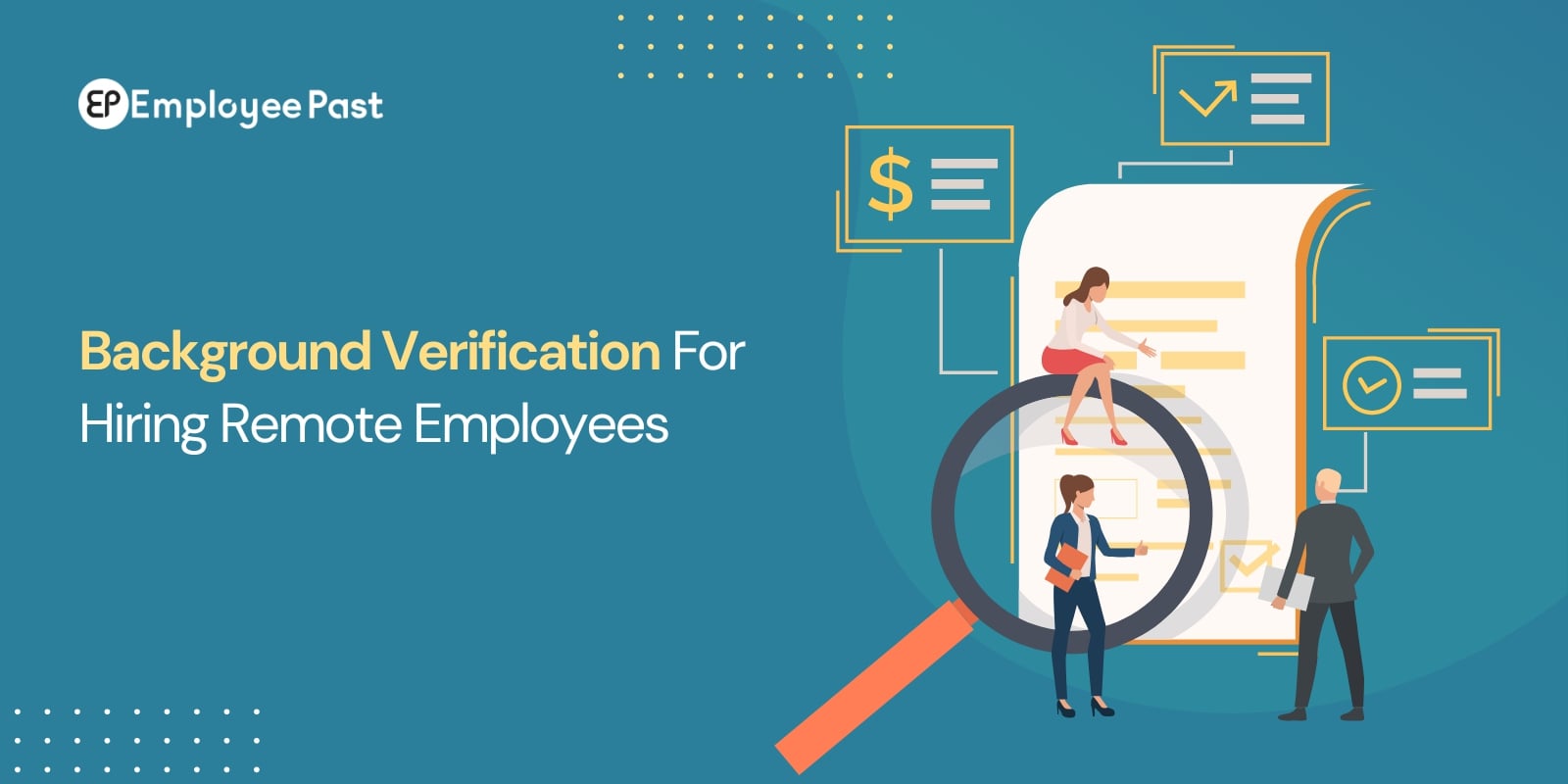- Sep 21, 2022
- Updates
- 10547
Share this post on:

The employment process has been permanently altered in the wake of the pandemic. While a vaccine may reduce the number of people working from home, it's unlikely to change the trend toward more remote work arrangements. Likewise, business owners have taken advantage of the productiveness of remote work to adopt it as a permanent practice.
A remote workforce means you never meet your new hire in person. An online interview process will only help you to determine the skills of the candidate. However, how can one be sure that the education, experience, job history, and other details on the employer's resume are accurate?
Here comes the role of background screening and verification. Checking the background of the employees gives an extra layer of protection to your company. It eliminates any red flags that harm your company and brand. Many large companies like Swiggy, Zomato, and Amazon which have many remote workers usually spend around USD 1.5-2 million each year on employee background screening to build a strong brand image.
Find out the essentials of background checks on remote employees and major tips on hiring remote workers by reading through the entire blog. Check it out!
Can employers run a background check for remote workers?
Well, getting informed candidates regarding background checks is crucial in any circumstances.
But does increasing the number of remote jobs imply that firms can avoid paying for background screening? Certainly not. Whether they are working in the office or at home, bad hires are bad ones.
The remote employees have the same access to the company’s critical information, purchaser documents, any monetary information, etc. Employers must therefore undertake a thorough background check on remote personnel in the same manner as they do for on-site premise staff.
Why background screening is crucial for remote employee hiring?
Performing background screening for hiring remote employees is crucial to avoid certain risks. Check it out-
1. Data loss
As we have already mentioned, the remote employee has the same complete access to the company’s confidential information. Any carelessness in a background check can leak data and security system breaches. Therefore, it is necessary to perform background screening and verification to ensure all information provided in the resume is true, and the applicant is trustworthy to bring on board.
2. Company reputation
If you hire someone who has a bad reputation, that is directly adverse to your company’s reputation, too. A proper background screening of the remote employee ensures that your brand’s image is secure and safe. Hence, to avoid bad reputations of employees, background checks are very important.
3. Cost of hiring
Lastly, many resources such as advertising and time are used by recruiters to hire a candidate. If somehow the candidate got selected, many expenses and time were spent on the training period. In this case, the company had to arrange and set up an internal system for remote employees.
Hence, background checks enlighten the company regarding the job history and ensure the credibility and truthfulness of the applicant.
Challenges in remote employee background screening and verification
Accomplishing background screening and verification for remote employees can be a tedious task. Get to know how!
1. The shortage of time
Any employee background screening and verification can take from 24 hours up to several weeks. As a result, this delays the hiring process and might affect the company’s productivity. Many times, when the background investigation is finally finished, and the business is prepared to hire a competent applicant, it frequently takes too long, and the applicant already interviews somewhere and accept another position.
2. It all boils down to money
Remote employee background screening and verification can be costly. Finding even seemingly unimportant information—such as an employee's background or medical history—can be quite expensive. Unfortunately, these background checks are not always within the budget of small business owners and entrepreneurs. Therefore, organizations must have access to affordable background screening solutions that provide insight into risk factors without destroying the overall balance.
Tips for conducting Background checks on Remote Employees
Employees must weigh a variety of variables before deciding whether to hire a remote applicant or not. Consider using this quick checklist to help you decide if the candidate is qualified to work for your company.
1. Candidate job and employment history
Employers are responsible for taking care to avoid making any hiring decisions that are bad for the company. Although social media sites like LinkedIn are reliable sources for screening, they don't always result in the right choice.
An applicant may exaggerate their resume on their prior employment and educational credentials. Therefore, background checks are the only way for hiring managers to determine an applicant's education and employment history with accuracy.
2. Sanction checks
Financial crimes are a great risk to any organization. As a result, firms have to a number of safety measures to protect themselves against these financial crimes. A company may quickly search national databases and listings using sanction screening to find out whether candidates have ever been subject to employment penalties or exclusions.
3. Social media screening
If you decided to skip social media screening, then this might be not a good decision in the recruitment process. Social media screening is performed in a compliant and consistent manner. It
is a useful way to search the job applicant profile before hiring. It can also be done with the permission of the candidate. This procedure guarantees accuracy and lowers the possibility of legal action for the employer.
One should have a clear idea about what they are looking for by reviewing the job applicant's social media profile. You may find out a lot of things about people based on their social media profiles but only focus on the relevant information. Hence, search for the qualities that directly correlate with their ability to perform in the role you’re hiring them for.
4. Educational verification
It is another essential process that verifies the job candidate’s degrees earned at their high school and colleges. It proves whether the candidate attended the degrees they claimed to have attended. An employer needs some basic information such as the full name of the candidate, address, title of the degree pursued, and also a signed authorization release from the applicant.
The educational verification of remote candidates helps to weed out dishonest ones. It also ensures that the company hires someone who is qualified and has good moral character.
Also Read: Hire With Confidence: Need Of Background Checks In 2022!
What bad hiring costs a company?
Whether hiring for in-office or remote personnel, poor hiring can cost an organization. A wide-ranging background screening procedure can assist to reduce this risk by confirming the information that candidates submit before hiring, rather than learning about problems afterward. Hiring a new employee carries some risks, but can be minimized.
Here are some of the consequences that could result from bad hiring -
1. A loss of productivity
Hiring someone who is not good for the position can provide a negative impact on productivity. They are unable to do their duties effectively, which results in missed deadlines and objectives for the company. Poor hiring encourages managers and other employees to work harder, which lowers group morale and increases inequality.
2. Company cultural imbalance
Company culture is very crucial for a safe work environment. Having cracks in the culture, simply because other members don't add value to the team, can impact the whole workforce. Hiring a remote employee who doesn’t fit in with the company culture can negatively impact everyone, especially if they have a negative attitude in the workplace.
3. Financial impact
A bad hiring mistake can cost any organization thousands of dollars. It is because firstly, the company wasted many resources on you for training. Additionally, they must pay the salary of a worker who doesn't perform well. Moreover, depending on the terms of the contract, the business may have to shell out a sizable sum of money once more for both the expense of hiring a replacement employee and the employee's severance compensation if they decide to fire the worker.
4. Reputation
Poor hiring decisions can harm the company's reputation, especially for the marketing team, which interacts directly with customers. As a result, this may harm client relationships, cost businesses contracts, and hurt sales.
Not only that, but coworkers may doubt the capacity of top-level management to make wise decisions when a company chooses a terrible recruit who is then retained. The relationship between management and employees at a business may be strained as a result.
5. Low employee morale
Bad hiring, if he/she doesn’t perform the expectations, this effect the rest of the team. If the team is dependent on a person who does not give enough to the team, the remaining employees may feel unsatisfied or lose motivation. Employee morale may suffer as a result, and stress or conflict may result. Employee dissatisfaction may even lead to their departure, which would result in the loss of talent, expertise, and skills for the company.
How EmployeePast can help you?
During the remote hiring process for your business, EmployeePast helps you to make the best choice possible. We help businesses to build successful relationships with their customer base globally. We provide 24*7 services to respond to your questions and fix problems right away if they arise.
You can rely on EmployeePast to thoroughly investigate each candidate's background, whether you are employing local employees or remote ones.
Final words!
To confirm a candidate's educational background, and employment history, a background check may gather data from a variety of sources. The traditional method of employee screening and background verification seems complicated. If you are looking to hire remotely, the background verification company needs to be combined with the challenges of remote hiring and remote employment.
Conduct background screening with EmployeePast! Get accurate background checks for reducing risk, abiding by laws, keeping a safe workplace, and hiring the most qualified candidates.










